excited,exciting的区别
以ed和ing结尾的形容词汇总

以ed和ing结尾的形容词以-ing和-ed结尾形容词的区别用法:1. 以后缀-ed结尾的形容词,如ashamed, delighted, excited, frightened, interested, moved, pleased, surprised, worried等,一般用来形容人的感受,表示“感到......的”,作表语。
如:He had a pleased smile on his face. 他脸上露出了满意的微笑。
He told me the news in a very excited voice. 他告诉了我这个消息,声音很激动。
第一句中的a pleased smile 意为“满意的微笑”,它指的是某人因感到满意发出的微笑;第二句中的 excited voice 指的是“激动的声音”,即指的是带有这种声音的某人感到激动。
原则上,-ed 形容词通常直接用于说明人,若修饰事物,则多为 air(神态), appearance(外貌),cry(哭声), face(表情), voice(声音), mood(情绪)等与显示某人的情感状况的名词。
2. 以后缀-ing结尾的形容词,如delighting, exciting, frightening, interesting, moving, surprising, worrying 等,一般用来形容事或物本身具有的性质,表示“令人......的”,作表语或定语。
如:The story is very interesting. 这个故事很有趣。
The man is very interesting. 这个人很有趣。
3、常见的v.-ing,v.-ed词及短语总结如下:exciting令人兴奋的 excited感到激动的 be excited about对......感到激动surprising 令人惊奇的 surprised感到好奇的 be surprised at对......感到惊奇amazing令人惊讶的. amazed感到惊讶的 be amazed at对......感到惊讶tiring 令人厌倦的 tired感到厌烦的 be tired of对......感到厌烦annoying令人生气的 annoied感到生气的 beannoied with生......的气worrying令人担心的 worried感到担心的 be worried about 为......担心encourage 令人鼓舞的 encouraged 受到鼓舞的interesting 有趣的 interested 感兴趣的astonishing令人惊呆的 astonished 惊呆的moving 令人感动的 moved 感动的frightening令人害怕的 frightened害怕的terrifying令人恐惧 terrified感到恐惧的puzzling 令人困惑不解的 puzzled感到困惑的satisfying令人满意的 satisfied感到满意的boring 令人讨厌的 bored感到厌烦的touching 触动人心的 touched感动的embarrassing令人尴尬的 embarrassed尴尬的。
excited 和exciting 的区别
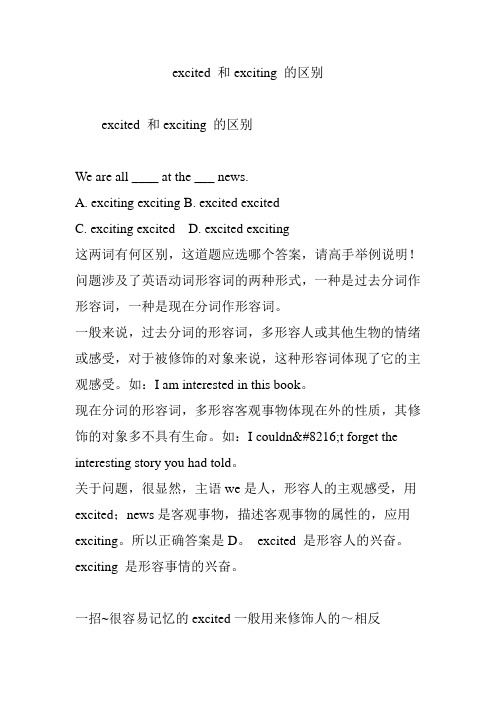
excited 和exciting 的区别excited 和exciting 的区别We are all ____ at the ___ news.A. exciting excitingB. excited excitedC. exciting excitedD. excited exciting这两词有何区别,这道题应选哪个答案,请高手举例说明!问题涉及了英语动词形容词的两种形式,一种是过去分词作形容词,一种是现在分词作形容词。
一般来说,过去分词的形容词,多形容人或其他生物的情绪或感受,对于被修饰的对象来说,这种形容词体现了它的主观感受。
如:I am interested in this book。
现在分词的形容词,多形容客观事物体现在外的性质,其修饰的对象多不具有生命。
如:I couldn‘t forget the interesting story you had told。
关于问题,很显然,主语we是人,形容人的主观感受,用excited;news是客观事物,描述客观事物的属性的,应用exciting。
所以正确答案是D。
excited 是形容人的兴奋。
exciting 是形容事情的兴奋。
一招~很容易记忆的excited一般用来修饰人的~相反exciting是用来修饰物的~这样就容易理解了~指人用ed,指物用ing,excited在句子中指人的心情.exciting 在句子中指事物的反应excite是使役动词,翻译成中文就是使...激动的意思,所以形容人的情绪时就是用被动态的分词,在形容事件让人激动就用ing形式ing 形式和ed 形式虽然都是作形容词,但是在意义上是有区别的。
ing形式做定语,意义上接近一个定语从句,表示一个正在进行的动作或表示一个主动的动作如:China is a developing country=China is a country which is developing)ed式的则通常表示已发生的或已结束的动作,ing则表示正在发生的如:boiled water开过了的水,白开水。
ed形容词和ing形容词

–ed形容词和–ing形容词的用法区别1,以后缀–ed结尾的形容词(如ashamed, delighted, excited, frightened, interested, moved, pleased, surprised, worried等)通常用于说明人,不用于说明事物,即使它们所修饰的名词是事物,那它们指的也是与该事物相关的人。
如:He had a pleased smile on his face.他脸上露出了满意的微笑。
He told me the news in a very excited voice.他声音很激动地告诉了我这个消息。
原则上,-ed 形容词通常直接用于说明人,若修饰事物,则多为air(神态), appearance(外貌), cry(哭声), face(表情), voice(声音), mood(情绪)等显示某人的情感状况的名词。
2. 以后缀-ing 结尾的形容词(如delighting, exciting, frightening, interesting, moving, surprising, worrying 等)主要用于说明事物,表示事物的性质或特征,若用它们说明人,则表示此人具有此性质或特征。
如:The story is very interesting. 这个故事很有趣。
The man is very interesting. 这个人很有趣。
请再比较并体会以下句子:He is frightened. 他很害怕。
He is frightening. 他很吓人。
He has a frightened look on his face. 他脸上带有惊恐的神情。
He has a frightening look on his face. 他脸上带有吓人的神情。
I read an interested expression on his face. 我看到他脸上露出一种感兴趣的表情。
几个词义的辨析

1、【词语辨析】care about/ care for(1)care about和care for都有“关心、照料”的意思;(2)二者的区别是care about还指“介意、在乎”,care for指“喜欢、想要”。
(3)一句话记忆:The man whom you care for never cares about what people say.2、【词语辨析】 excited / exciting(1)exciting既可修饰人也可修饰物。
修饰人时,指人“有鼓动力的”;修饰物时,指事物“令人兴奋的,令人激动的”。
(2)excited一般只可修饰人,指人“激动的,兴奋的”。
(3)一句话记忆:We were excited to hear the exciting news.3、【词语辨析】compare to / compare with(1) compare...with...把…和…比较(常表示同类相比,比较);(2)compare...to...把…比作…(常表示异类相比,比喻)。
(3)例句:——The poets often compare life to a river. ——My English can't compare with his.4、【词语辨析】 friendly with / friendly to(1)friendly to指“对……友好/友善”,后可跟人或物;(2)friendlywith后一般跟人,指“与某人友好相处”。
(3)一句话记忆:He is friendly to the plan and I am not, but we are still friendly with each other.5、【词语辨析】get in /get on(1)get in/get on都指“上(车)”但车不同:get in一般指上小汽车,出租车;get on 指上飞机,船,公共汽车,火车,自行车,马等。
excited__exciting区别
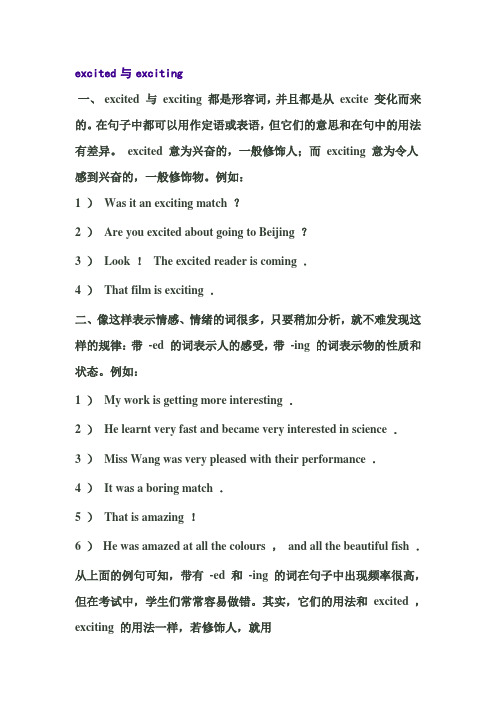
excited与exciting一、excited 与exciting 都是形容词,并且都是从excite 变化而来的。
在句子中都可以用作定语或表语,但它们的意思和在句中的用法有差异。
excited 意为兴奋的,一般修饰人;而exciting 意为令人感到兴奋的,一般修饰物。
例如:1 )Was it an exciting match ?2 )Are you excited about going to Beijing ?3 )Look !The excited reader is coming .4 )That film is exciting .二、像这样表示情感、情绪的词很多,只要稍加分析,就不难发现这样的规律:带-ed 的词表示人的感受,带-ing 的词表示物的性质和状态。
例如:1 )My work is getting more interesting .2 )He learnt very fast and became very interested in science .3 )Miss Wang was very pleased with their performance .4 )It was a boring match .5 )That is amazing !6 )He was amazed at all the colours ,and all the beautiful fish .从上面的例句可知,带有-ed 和-ing 的词在句子中出现频率很高,但在考试中,学生们常常容易做错。
其实,它们的用法和excited ,exciting 的用法一样,若修饰人,就用-ed 形式的词,若修饰物就用-ing 形式的词。
三、初中英语课本中出现过的类似词语有:interest → interested/interesting (感兴趣的/有趣的)excite → excited /exciting (兴奋的/令人兴奋的)move → moved/moving (感动的/令人感动的)surprise → surprised /surprising (感到惊奇的/使人惊奇的)please → pleased/pleasing (高兴的/令人高兴的)bore → b ored/boring (厌烦的/令人厌烦的)tire → tired /tiring (厌倦的/令人厌倦的)amaze → amazed /amazing (惊奇的/令人惊奇的)frighten → frightened/frightening (受惊恐的/令人惊恐的)puzzle → puzzled/puzzling (迷惑的/令人迷惑的)练习:用每题后括号中所给单词的适当形式填空。
excited等过去分词和exciting等现在分词的区别

以后缀–ed结尾的形容词(如ashamed, delight ed, excited, frightened, interested, moved, ple ased, surprised, worried等)通常用于说明人,不用于说明事物,即使它们所修饰的名词是事物,那它们指的也是与该事物相关的人。
如:He had a pleased smile on his face.他脸上露出了满意的微笑。
He told me the news in a very excited voice.他声音很激动地告诉了我这个消息。
第一句中的a pleased smile 意为“满意的微笑”,它指的是某人因感到满意发出的微笑;第二句中的a very excited voice 指的是“很激动的声音”,即指的是某人因很激动而发生那样的声音。
原则上,-ed 形容词通常直接用于说明人,若修饰事物,则多为air(神态), appearance(外貌), cry(哭声), face(表情), voice(声音), mood(情绪)<'Times New Roman'">), mood(等显示某人的情感状况的名词。
2. 以后缀-ing 结尾的形容词(如delighting, ex citing, frightening, interesting, moving, surpri sing, worrying 等)主要用于说明事物,表示事物的性质或特征,若用它们说明人,则表示此人具有此性质或特征。
如:The story is very interesting. 这个故事很有趣。
The man is very interesting. 这个人很有趣。
请再比较并体会以下句子:He is frighteningHe is frightened. 他很害怕。
. 他很吓人。
He has a frightened look on his face. 他脸上带有惊恐的神情。
【粤人版,开心英语】六年级下册英语素材-Unit 4 Feeling Excited 知识总结

Unit 4 Feeling Excited 学问总结及课文翻译单词tired累的:疲乏的scared可怕的;受惊的(scary:用来形容物,意为“令人可怕的”。
scary指某物或人本身是“引起慌张的;胆小的;提心吊胆的”,主语是该物或人(如:it is scary.);scared:用来形容人,指人的心理状态scared指某物或人使你感到“恐惊的,可怕的”,是由scare这个动词而来的,主语是你(即感受到恐惊的这个人)(如:I'm scared)。
)excited兴奋的(excited 与exciting 都是形容词,并且都是从excite 变化而来的。
在句子中都可以用作定语或表语,但它们的意思和在句中的用法有差异。
excited 意为兴奋的,一般修饰人;而exciting 意为令人感到兴奋的,一般修饰物。
)sad哀痛的---反义词--happy开心的、兴奋stayed连续处于某种状态. (stay的过去时形式)stay up late很晚于;熬夜heard听到( hear的过去时形式hear的同音词:here)noise噪音;声响--形容词是noisy指的是吵闹的或者是吵杂的got拿到(get的过去时形式)kitten小猫(kitten通指小猫咪,指刚诞生不久的猫儿。
而cat都指那种猫咪,已经是成长好了的猫。
这个区分就和puppy与dog一样,puppy是小狗狗,dog是大狗狗。
其实也不是大,只是成年的狗而已)got a poor grade考得分数低because由于climb爬mountain山why为什么into进人……里面cave洞angry生气的(be angry at sth.因某事而生气get angry at sth.因某事而生气be angry about sth.因某事而生气get angry at about sth.因某事而生气be angry with sb.生某人的气get angry with sb.生某人的气be angry at sb. for因...生某人的气get angry at sb. for因...生某人的气make sb. angry使某人生气)Unit 4 Story故事翻译On a very cold day...在格外寒冷的一天……I'm excited because we're going to climb the mountain!我很兴奋,由于我们将要爬山!I'm scared.我很可怕。
仁爱英语八上unit 1 topic3知识点讲解
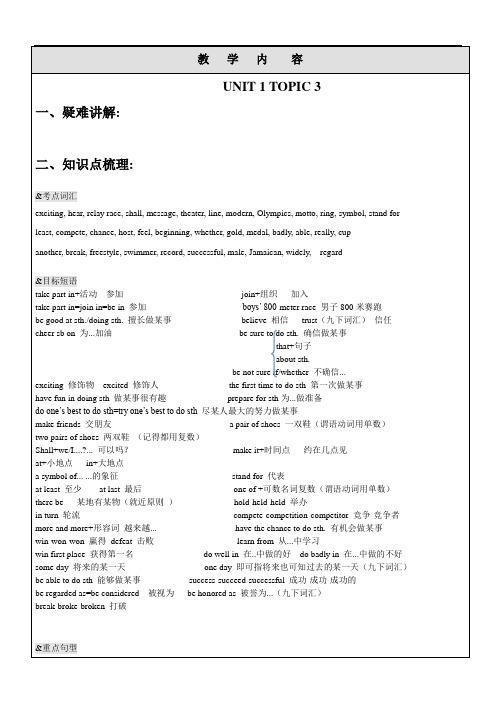
6. I hope so.我也希望如此。
(1)So代表前边前边所指的事情。
(2)I hope not.我不希望如此。
(3)I think so.我也这么认为。
(4)I don’t think so.我不这么认为。
7. Steve,my best friend, will come to cheer us on. Steve,我最好的朋友会来为我们加油。
be in :参加某种活动,强调状态
5. I believe you will win.我相信你会赢。
(1) Believe(vt)相信,信任
I believe it is true.
I believe she will come.
(2) believe (vi)信任,信仰
To believe in God相信上帝
3. I will be in the long jump and the high jump.我会参加跳远和跳高。
4. I believe you will win.我相信你会赢。
5. Steve,my best friend, will come to cheer uson. Steve,我最好的朋友会来为我们加油。
18. The Olympics are becoming more and more popular.奥林匹克运动会正在变得越来越流行。
19. In the future, more cities will have the chance to hold the Olympics and the Olympic Games will be more exciting.在将来,更多的城市将会有机会举办奥运会,奥运会会更加振奋人心。
几个词义的辨析

几个词义的辨析1、【词语辨析】care about/ care for(1)care about和care for都有“关心、照料”的意思;(2)二者的区别是care about还指“介意、在乎”,care for指“喜欢、想要”。
(3)一句话记忆:The man whom you care for never cares about what people say.2、【词语辨析】 excited / exciting(1)exciting既可修饰人也可修饰物。
修饰人时,指人“有鼓动力的”;修饰物时,指事物“令人兴奋的,令人激动的”。
(2)excited一般只可修饰人,指人“激动的,兴奋的”。
(3)一句话记忆:We were excited to hear the exciting news.3、【词语辨析】compare to / compare with(1) compare...with...把…和…比较(常表示同类相比,比较);(2)compare...to...把…比作…(常表示异类相比,比喻)。
(3)例句:——The poets often compare life to a river. ——My English can't compare with his.4、【词语辨析】 friendly with / friendly to(1)friendly to指“对……友好/友善”,后可跟人或物;(2)friendlywith后一般跟人,指“与某人友好相处”。
(3)一句话记忆:He is friendly to the plan and I am not, but we are still friendly with each other.5、【词语辨析】get in /get on(1)get in/get on都指“上(车)”但车不同:get in一般指上小汽车,出租车;get on 指上飞机,船,公共汽车,火车,自行车,马等。
如何区分exciting和excitied,interesting和interested等词汇
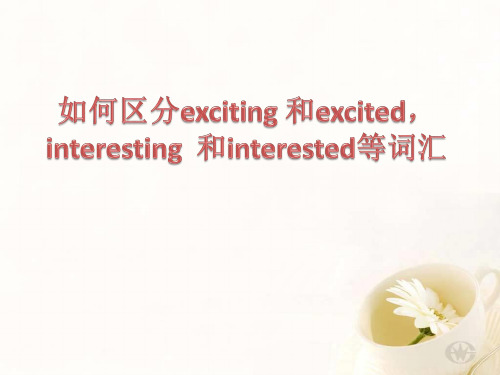
Exercise 1
请选择正确的形容词填空。
1. We are all
by the news.
以ing后缀结尾的形容词,通常用来形容事物 本身,以ed后缀结尾的形容词,通常用来形容人 或生物的感受。
The book is very interesting. She is very interested in the book.
The film is very exciting. The children are very excited.
什么情况下要用加ed的形容词,什么情 况下又要用加ing的形容词呢?怎样区分这些 形容词的用法呢?
1. The news is very surprising.(这是一则令人惊讶的新闻。) I’m very surprised. (我对这则新闻感得很惊讶。)
2. The story is very interesting. (这个故事很有趣。) I’m interested in it.(我对这个故事很感兴趣。)
请正确读出下列这些句子
1. The news is very surprising.(这是一则令人惊讶的新闻。) I’m very surprised. (我对这则新闻感得很惊讶。)
2. The story is very interesting. (这个故事很有趣。) I’m interested in it.(我对这个故事很感兴趣。)
A. exciting B. excited
2. We give our big hands for their 演).
Exciting与excited

relax,relaxed,relaxing的区别和语 法
• • • • relax 是动词 relax sb. 使某人放松 relaxing是形容词 sth is relaxing relaxed是形容词 sb be relaxed 那么音乐令人放松. Music is relaxing Music makes people feel relaxed. • People are relaxed.
• 1. I like English, but I’m really ___ of ___ grammar. A tired; boring B tiring; boring • C tiring; bored D tired; bored
• 2.The film was so ____ that soon all the children in the cinema began feeling ____of it and they went out one by one. A. bored boring B.boring boring • C.bored bored D.boring bored
Exciting与excited
interest、interesting、interested有 何区别
• 1)interest用作不可数名词时意为“兴趣, 关心, 重要性, 影响, 利息,利益, 利害”。用 作动词时意为“使发生兴趣,引起...的注 意”,其主语多为事或物。 • eg:I have no interest in your plan。我对 你的计划没有兴趣
• 3.Why are you so____in the _____TV play? A.interesting;boring B.interesting;bored C.interested;bored D.interested;boring
excited等过去分词和exciting等现在分词的区别

excited等过去分词和exciting等现在分词的区别以后缀–ed结尾的形容词(如ashamed, delight ed, excited, frightened, interested, moved, ple ased, surprised, worried等)通常用于说明人,不用于说明事物,即使它们所修饰的名词是事物,那它们指的也是与该事物相关的人。
如:He had a pleased smile on his face.他脸上露出了满意的微笑。
He told me the news in a very excited voice.他声音很激动地告诉了我这个消息。
第一句中的a pleased smile 意为“满意的微笑”,它指的是某人因感到满意发出的微笑;第二句中的a very excited voice 指的是“很激动的声音”,即指的是某人因很激动而发生那样的声音。
原则上,-ed 形容词通常直接用于说明人,若修饰事物,则多为air(神态), appearance(外貌), cry(哭声), face(表情), voice(声音), mood(情绪)<'Times New Roman'">), mood(等显示某人的情感状况的名词。
2. 以后缀-ing 结尾的形容词(如delighting, ex citing, frightening, interesting, moving, surpri sing, worrying 等)主要用于说明事物,表示事物的性质或特征,若用它们说明人,则表示此人具有此性质或特征。
如:The story is very interesting. 这个故事很有趣。
The man is very interesting. 这个人很有趣。
请再比较并体会以下句子:He is frighteningHe is frightened. 他很害怕。
excite的形容词形式
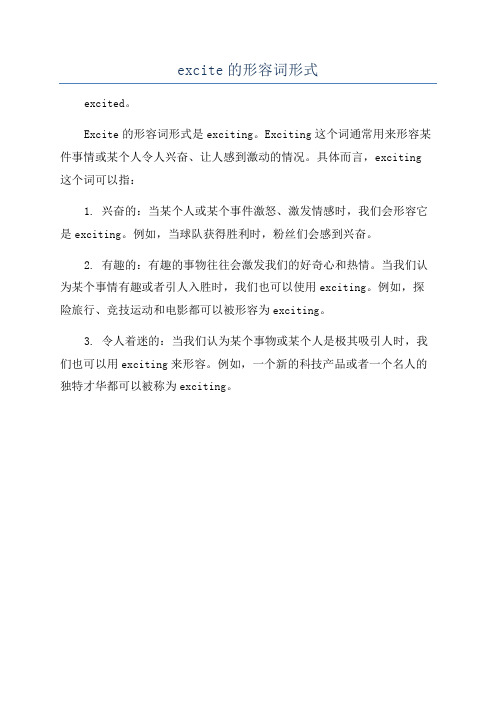
excite的形容词形式
excited。
Excite的形容词形式是exciting。
Exciting这个词通常用来形容某件事情或某个人令人兴奋、让人感到激动的情况。
具体而言,exciting 这个词可以指:
1. 兴奋的:当某个人或某个事件激怒、激发情感时,我们会形容它是exciting。
例如,当球队获得胜利时,粉丝们会感到兴奋。
2. 有趣的:有趣的事物往往会激发我们的好奇心和热情。
当我们认为某个事情有趣或者引人入胜时,我们也可以使用exciting。
例如,探险旅行、竞技运动和电影都可以被形容为exciting。
3. 令人着迷的:当我们认为某个事物或某个人是极其吸引人时,我们也可以用exciting来形容。
例如,一个新的科技产品或者一个名人的独特才华都可以被称为exciting。
excite的派生词汇总
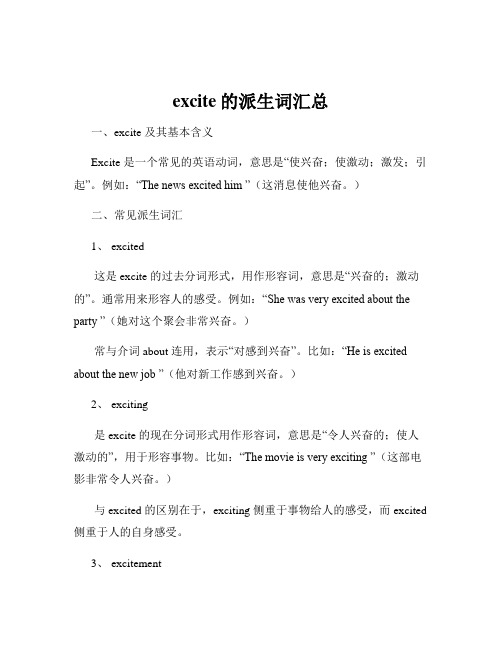
excite的派生词汇总一、excite 及其基本含义Excite 是一个常见的英语动词,意思是“使兴奋;使激动;激发;引起”。
例如:“The news excited him ”(这消息使他兴奋。
)二、常见派生词汇1、 excited这是 excite 的过去分词形式,用作形容词,意思是“兴奋的;激动的”。
通常用来形容人的感受。
例如:“She was very excited about the party ”(她对这个聚会非常兴奋。
)常与介词 about 连用,表示“对感到兴奋”。
比如:“He is excited about the new job ”(他对新工作感到兴奋。
)2、 exciting是 excite 的现在分词形式用作形容词,意思是“令人兴奋的;使人激动的”,用于形容事物。
比如:“The movie is very exciting ”(这部电影非常令人兴奋。
)与 excited 的区别在于,exciting 侧重于事物给人的感受,而 excited 侧重于人的自身感受。
3、 excitement是名词形式,意思是“兴奋;激动;刺激”。
例如:“The children shouted with excitement ”(孩子们兴奋地叫喊。
)常见短语有“in excitement ”(兴奋地),“to one's excitement ”(令某人兴奋的是)。
4、 excitable形容词,意思是“易激动的;易兴奋的”。
例如:“He is an excitable person ”(他是个易激动的人。
)5、 excitatory形容词,主要用于生物学和医学领域,表示“兴奋的;刺激性的”。
比如:“excitatory neurotransmitter ”(兴奋性神经递质)6、 excitementally是一个合成词,意思是“在精神上激励;在精神上使兴奋”。
7、 unexcited形容词,意思是“未兴奋的;不激动的”。
- 1、下载文档前请自行甄别文档内容的完整性,平台不提供额外的编辑、内容补充、找答案等附加服务。
- 2、"仅部分预览"的文档,不可在线预览部分如存在完整性等问题,可反馈申请退款(可完整预览的文档不适用该条件!)。
- 3、如文档侵犯您的权益,请联系客服反馈,我们会尽快为您处理(人工客服工作时间:9:00-18:30)。
excite 动词,意为"(使)兴奋;激发;唤起",其形容词为excited和exciting。
excited 形容词,表示"兴奋的",指人、物对......感到兴奋,是(主动地感到)兴奋的exciting 形容词,表示"令人兴奋的;使人激动的",指人、事、物本身让人兴奋、激动exciting boy 令人兴奋的男孩试比较:Are you excited about going to Beijing? 你要去北京了,感到兴奋吗?He told us an exciting story yesterday. 他昨天给我们讲了一个使人激动的故事。
It's nothing to get excited about. 这没什么可值得激动的。
I've got an exciting piece of work. 我得到了一份令人兴奋的工作。
基本句型:物+ 动词+ 人The book interests me. = 物+ be V-ing to + 人The book is interesting to me. = 人+ be V-ed 介+ 物I am interested in the book. 还有一些类似的词interest 使…感兴趣interesting interested surprise 使…惊讶surprising surprised trouble 使…烦恼troubling troubled satisfy 使…满意satisfying satisfied bore 使…厌烦boring bored confuse 使…困扰confusing confused tire 使…疲倦tiring tired embarrass 使…难堪embarrassing embarrassed scare 使…惊吓scaring scared worry 使…担心worrying worried。
